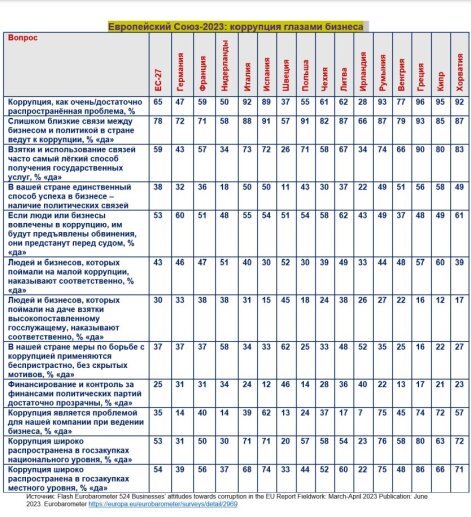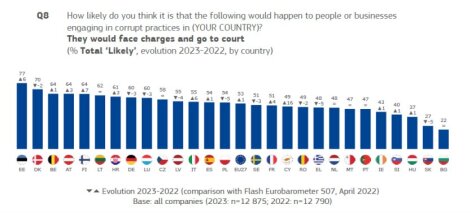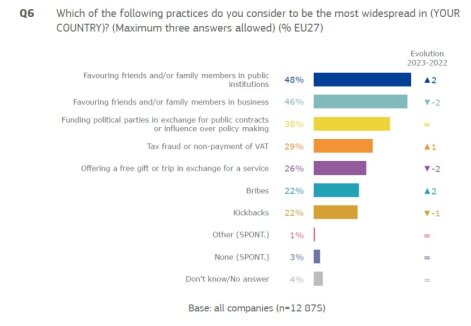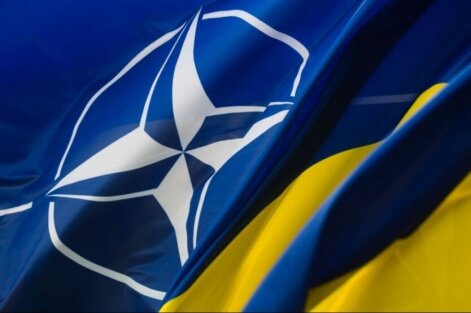Formally, Ukraine has not yet been accepted into NATO, because there is corruption in the country. The problem of corruption is heard in the negotiations on Ukraine's accession to the European Union. There is not a single investment forum that does not include the fight against corruption on the list of tasks for Ukraine. Dozens of bodies and organizations are fighting this evil.
Is there corruption in Ukraine? - Undoubtedly. With such a size of the State, a huge functionality of the stewards of someone else's, discretion in interpreting the law and a mess in the public administration system, corruption cannot but exist.
Are there agencies and organizations in Ukraine to fight corruption? Yes, there are, and there are many. Special services, NABU, NACP, SAPO, the Supreme Anti-Corruption Court, the SBI, the National Agency of Ukraine for the identification, search and management of assets obtained from corruption and other crimes - there are many anti-corruption officials in the country.
Has there been less of it in Ukraine after the creation of a broad state infrastructure for combating corruption? – No, it didn’t, because nothing has changed in the legal system, in the institutions of power and property, in the structure of motivation. The roots of corruption are progressive tax rates and discretion in tax administration, monetary/currency prohibitions and restrictions, multiple customs duty rates, complex, lengthy, costly procedures for obtaining permits, licenses, discretion in government procurement, government investment, and resource/asset management.
The NATO and EU countries persistently offer Ukraine to fight corruption by introducing European institutions, practices and mechanisms. Numerous reports strongly recommend copying European legal norms. They say that it was like in the European Union. Let's see how things stand with corruption in the European Union itself through the eyes of European business, which is constantly confronted with government agencies. Based on the analysis, we will conclude whether the EU and NATO members themselves meet the criterion of corruption that is presented to Ukraine.
The results of the survey "Business attitudes towards corruption in the EU" (Flash Eurobarometer 524) were published in June 2023. Here are the main results. More than six out of ten EU companies (65%) believe that corruption is widespread in their countries. In Greece and Cyprus there are 95% of them. It is followed by Croatia (91%), Italy and Romania (92% each). All of them, except for Cyprus, are members of NATO. Even in law-abiding Germany, there are 47% of them. If by such a criterion to evaluate the corruption of the country (should be less than 50%), then half of the countries would have to be excluded from NATO.
35% of companies in the EU say that corruption is a problem in the conduct of their business. In Romania, there are 74% of such people, in Cyprus - 72%. The least of these are in Denmark (6%), Estonia and Ireland (7%). It is not superfluous to note that Ireland and Denmark have the best tax legislation in the EU, and Ireland has the lowest share of government spending to GDP - less than 25%.
In the EU, 48% of companies consider favoritism the most widespread corrupt practice. 72% of businesses agree that favoritism and corruption hinder business competition.
Ukraine is constantly criticized for the oligarchy, corrupt ties between business and politics. In the EU, according to business, this is almost a universal practice. 78% of European businesses believe that too strong ties between business and politics lead to corruption. Most of these are in Greece (93%), as well as in Poland, Portugal, Spain and Cyprus (91%). Even in Germany there are 72%, and in Italy - 88%, in Spain - 91%.
Bribes and connections as the easiest way to obtain public services in their countries - such in Spain 72%, in Italy 73%, Poland - 71%, in Greece - 90%, Croatia - 83%. Overall, in the EU, 59% of businesses believe that bribes and the use of connections are often the easiest way to obtain public services.
Corruption crimes are not always punished. In the EU, if people and businesses are caught giving a bribe to a high-ranking civil servant, then only 30% of businesses believe that there will be an appropriate punishment. In Greece, only 16% of businesses believe in punishment for such crimes, in Hungary - 22%, Poland - 18%, Spain - 15%, Italy - 31%. It turns out that both in the EU as a whole and in more than half of the country, a typical agreement between business and law enforcement authorities dominates. Similar responses to the question on the impartiality of the application of anti-corruption measures. In general, in the EU, only 37% of businesses believe that anti-corruption measures are applied equally to everyone.
Another important aspect to note is public procurement, which is controlled at the national and regional/local levels. Most businesses in the EU believe that corruption is widespread in this area: 53% in public procurement at the national level and 54% at the local level. Only in the Scandinavian countries, the Netherlands and Ireland, there are less than half of them. It turns out that even in the EU with its legal system, full democracy, formal independence of the courts and law enforcement agencies, corruption is widespread. According to this factor, Italy, Spain, Romania, Hungary and Greece would have to be expelled from NATO. Yes, and there are serious claims to Poland, Bulgaria, the Czech Republic and Slovakia.
Corruption as an excuse
The blocking of Ukraine's membership in NATO due to corruption in the context of the situation with this problem in most countries of the Alliance is not a reason, but a pretext. This is a far-fetched, clumsy excuse that obscures the real reasons for NATO's behavior. First, there is the position of the Biden administration, which is notable for its special relationship with the Kremlin, and also relies on highly idiosyncratic, often far from reality, security and risk assessment analytics. We saw this at the beginning of 2022, before the invasion of the Russian aggressor on February 24.
Secondly, there is fear, weakness and lack of understanding of the balance of threats and benefits among the main members of NATO in the context of the war waged by Ukraine against Russia. Constant references to the formal “NATO is not at war”, “you must not cross red lines”, “you must not drive Putin into a corner” in the regime of pipette military assistance to Ukraine requires a self-critical attitude towards oneself. Leadership crisis in the face. We need a reboot of NATO itself, the economic model of most of its members. There is no political will to do so. It is easier and easier to accuse Ukraine of corruption.
Thirdly, the Russian war in Ukraine exposed the weakness of the NATO countries in terms of providing Ukraine with the necessary amount of military goods to wage war. Warehouses have been cleaned up, and it is not so easy to establish the production of new weapons. Referring to corruption in Ukraine is easier for the policymakers of NATO countries than admitting their own mistakes in the organization of the military-industrial complex. One gets the impression that the NATO countries are taking a break in relations with Ukraine in order to understand for themselves the scenarios for the end of the war, what to do with the winner and Russia.
Fourth, the constant mention of corruption in negotiations and reports is a technique for pushing/forcing people to adopt their own agenda, their own rules of the game. Corruption is indeed a serious problem in Ukraine. During the war, it leads not only to the waste of money and resources, but also to the demoralization of society, the weakening of the defense capability. This behavior by NATO could backfire, especially given the content of the proposals that the West voices to Ukraine through the IMF, CSIS or the Center for Economic Policy Research (CEPR).

Source: Flash Eurobarometer 524 Businesses' attitudes towards corruption in the EU Report Fieldwork: March-April 2023 Publication: June 2023. Eurobarometer https://europa.eu/eurobarometer/surveys/detail/2969

In Bulgaria, when asked “if people or businesses are involved in corruption, they will be charged, they will face trial”, only 22% answered “yes”.


























